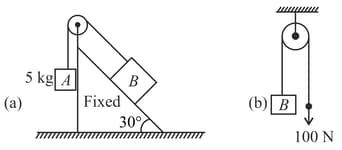A one meter long massless string fixed with a wall is pulled horizontally by applying a force of magnitude . Calculate:
(a) the tension at a point away from wall,
(b) the tension at a point away from wall,
(c) force exerted by string on the rigid support.

Important Questions on Laws of Motion
A block of mass is suspended by a string of mass , length as shown in the figure . Calculate:
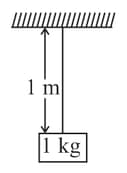
(a) the tension in string at its lowest point,
(b) the tension in string at its mid-point,
(c) force exerted by support on string.
A block of mass is suspended from the ceiling by a light string. A second block of mass is suspended from the first block through another string. Find the tensions in the two strings. Take .
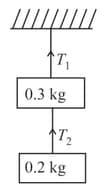
Two unequal masses and are connected by a string going over a clamped light smooth pulley as shown in figure and . The system is released from rest. (a) Find the distance travelled by the first block in the first two seconds. (b) Find the tension in the string. (c) Find the force exerted by the clamp on the pulley.

A mass is held in place by an applied force and a pulley system as shown in the figure. The pulleys are massless and frictionless.
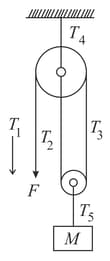
(a) Draw a free body diagram for each pulley.
(b) Find the tension in each section of rope and .
(c) Find the magnitude of .
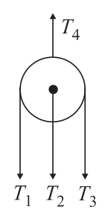
In the figure, the tension in the string between the points and is .
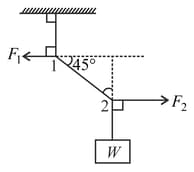
(a) Find the magnitude of the horizontal force and which must be applied to hold the system according to the position shown in figure.
(b) What is the weight of the suspended block?
A constant force is applied on the block of mass as shown in the figure. The string and the pulley are light and the surface of the table is smooth. Find the acceleration of .
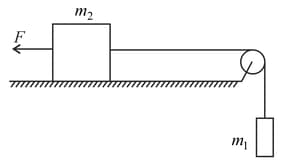
A chain consisting of five links each with mass is lifted vertically with constant acceleration of as shown. Find

(a) the forces acting between adjacent links.
(b) the force exerted on the top link by the agent lifting the chain.
(c) the net force on each link.
Find out the mass of block to keep the system at rest .
